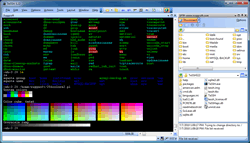Zugg
MASTER

Joined: 25 Sep 2000
Posts: 23379
Location: Colorado, USA
|
 Posted: Tue Nov 23, 2010 6:26 pm Posted: Tue Nov 23, 2010 6:26 pm
Advanced Windows SSH Client
|
| Quote: |
| Zugg Software has released version 3 of TeSSH, an advanced Telnet and SSH client for PC/Windows. TeSSH is a fully scriptable communication client with full VT100 and xterm emulation. Any Windows scripting language can be used by TeSSH including built-in integration with Lua and zScript, a language designed specifically for telnet applications. New to version 3 is integrated FTP/SFTP support, 256 color and mouse support, SQL scripting, Web scripting, and new Pattern and Script wizards for novice programmers. |
 Many people have asked me why they need a scriptable SSH client. Many IT Professionals use remote shell scripts and don't see the need for local scripting. Here are some reasons why local scripting is useful for system and network administration via SSH: Many people have asked me why they need a scriptable SSH client. Many IT Professionals use remote shell scripts and don't see the need for local scripting. Here are some reasons why local scripting is useful for system and network administration via SSH:
- Local scripts are stored locally and can therefore be used on any number of remote systems. Remote scripts need to be kept updated across dozens of computers. A Local script only needs to be updated once.
- Local scripts can be written using other scripting languages that might not be supported by the remote host. Local scripts can be written in Perl, Javascript, VBScript, Lua, or any other language that supports the Active Scripting interface in Windows. The zScript language was specifically designed for Telnet/SSH scripting and offers easy ways to highlight, capture and substitute text on the screen.
- Local scripts can perform functions that remote scripts cannot. For example, turning the background of the screen red when in "su" mode. Or highlighting important text from the server in different colors. Or filtering certain text from the server into different windows. Local scripts can query remote web sites via HTTP, or query remote database servers via SQL directly.
- Local scripts work well in combination with remote scripts. Remote scripts can be assigned to aliases, macros, or buttons within the local client to make them easier to use. It's the best of both worlds.
- Local scripts can be written using a more powerful local script editor which includes syntax highlighting and tooltip help. TeSSH uses the best-in-class open-source Scintilla editor component.
Beyond the power of local scripting, the modern user interface of TeSSH provides even more advantages:
- Multiple windows docked and tabbed into a custom layout can help manage multiple servers at the same time. Windows can be collapsed to tabs that automatically expand when they receive text or when made visible by a script. A layout connected to multiple servers can be saved to a single "super session" which can be used to reconnect to all of the servers with a single click. Session icons can be dragged to the Windows desktop for easy access to important servers.
- Windows 7 support. The TeSSH taskbar icon can be colored based upon activity within sessions. Right-clicking on the TeSSH taskbar icon allows you to access your common sessions.
- Integrated SFTP support allows you to edit remote files using the local Scintilla syntax-enabled editor. With scripting you can set the FTP window to follow your "cd" commands in the main SSH window, giving you a GUI interface to the remote file system at all times.
- Both local and server-assisted tab completion saves you typing. Autocomplete remote file paths, local script names, or any text displayed in the session window.
If you manage multiple remote computers for a living, you deserve the best tools to help with your job. TeSSH is a powerful addition to your system and network admin toolkit. Go to www.tessh.com for more information.
Feel free to use this article to post your own experiences on how local scripting or other TeSSH features have helped you with your IT job. |
|
